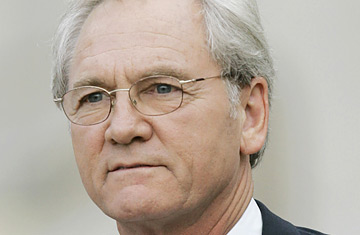
Former Alabama Governor Don Siegelman
(2 of 3)
Alabama is as red a state as the clay in its earth. After the years of rule by Southern Democrats, Republicans have now taken up residence in the Governor's mansion, as well as most statewide offices and congressional seats. In the 1990s Rove helped orchestrate a G.O.P. near sweep of the Alabama Supreme Court.
In this new Republican landscape, Siegelman emerged as one of the few Democratic stars, winning the Governor's race in 1998. He lost the seat in a close and contested race in 2002, but polls in 2003 showed that he had a good chance of recapturing the governorship. Then came the first indictment from the U.S. Attorney in Birmingham, charging Siegelman with using his position to rig a state bidding process. A judge dismissed the case in 2004 for lack of evidence. Just as Siegelman was preparing to run for Governor again, a second round of charges was brought in 2005 by the U.S. Attorney's office in Montgomery. His trial in 2006 overlapped with Alabama's Democratic primary, in which Siegelman had initially been a heavy favorite.
The investigation into Siegelman began as an inquiry into a contract held by Young to build a state warehouse in Alabama. Young was a well-liked figure in Montgomery who, by his own account, was in the habit of handing out cash, checks, rides on his private airplane and other goodies to members of both political parties. In return, he apparently hoped to receive favorable treatment for his garbage dumps and other lucrative state-related business.
Young testified that he had furnished Siegelman with an all-terrain vehicle and a motorcycle, lavishing money on the Governor and his aides. But he was an equal-opportunity influence monger. Early in the investigation, in November 2001, Young announced that five years earlier, he "personally provided Sessions with cash campaign contributions," according to an FBI memo of the interview. Prosecutors didn't follow up that surprising statement with questions, but Young volunteered more. The memo adds that "on one occasion he [Young] provided Session [sic] with $5,000 to $7,000 using two intermediaries," one of whom held a senior position with Sessions' campaign. On another occasion, the FBI records show, Young talked about providing "$10,000 to $15,000 to Session [sic]. Young had his secretaries and friends write checks to the Sessions campaign and Young reimbursed the secretaries and friends for their contributions."
If true, Young's statements describe political money laundering that would be a clear violation of federal law. In 1996, when Young said he had made the contributions, it was illegal to give a candidate more than $1,000 for a primary or general campaign. None of the individuals Young named as his intermediaries in making the donations are listed in Federal Election Commission records as contributors to Sessions' 1996 U.S. Senate race. "We have on record a $1,000 contribution from Mr. Young during the 1996 election cycle and no record of any other contribution from him," says a spokesman for Sessions.
Young also openly offered details about what he said were donations totaling between $12,000 and $15,000 to Pryor's campaign for state attorney general. Once again, Young had used the friends-and-colleagues maneuver. According to the FBI record, "Young advised that during Pryor's 1998 campaign, he contributed money through other individuals." Young named four people who "all wrote checks to Pryor's campaign and were reimbursed by Young for their contributions." At one point in the conversation, Young seemed particularly eager to tell all. "This was not just for the Governor's [Siegelman's] campaign," he told investigators. "It was also for the attorney general's campaign ... I gave you the example of five checks totaling $25,000. If I was there, I would write them out or just sign them, and they would fill in who it was to or whatever." According to Young, a top official on Pryor's campaign "would call and say, 'I need money for this, this or this,'" and Young would take care of the request. ("I do not have a recollection of the amounts that you describe as having been contributed by Lanny Young or his associates to my campaign," Pryor wrote in an e-mail to TIME.)
But it wasn't always as impersonal as handing over a stack of bills or checks. Among the illegal actions alleged in Siegelman's indictment was his acceptance from Young of thousands of dollars' worth of free T shirts and hundreds of specially embossed coffee mugs to give away as Christmas presents. The freebies were popular, said Young. "I had got them coffee cups and stuff before and shirts, and I had the same thing for Bill [Pryor]." Young estimated the value of the mugs at $13,000 to $15,000, and he even offered to share the extras with his inquisitors: "I've still got a case of his [Pryor's coffee cups] ... if y'all want to come get them." ("I don't think we want to touch them right now," an investigator replied.)
